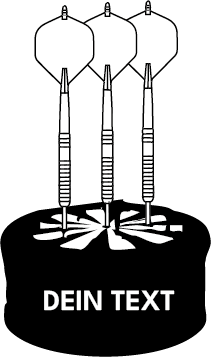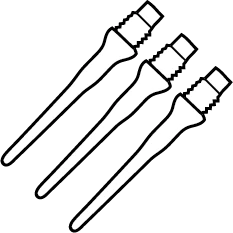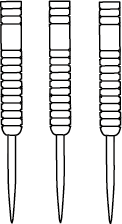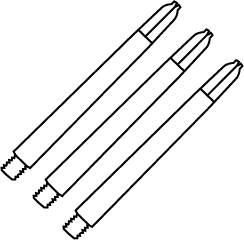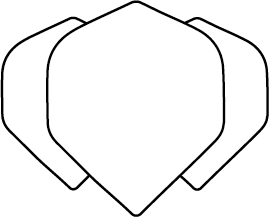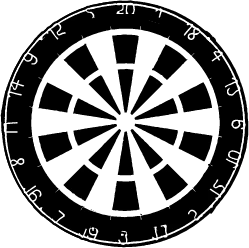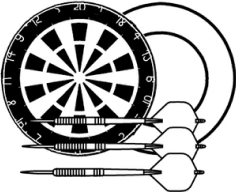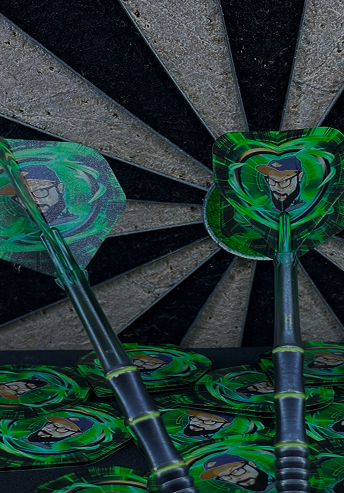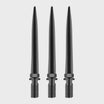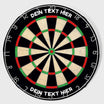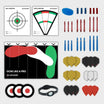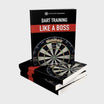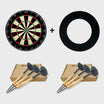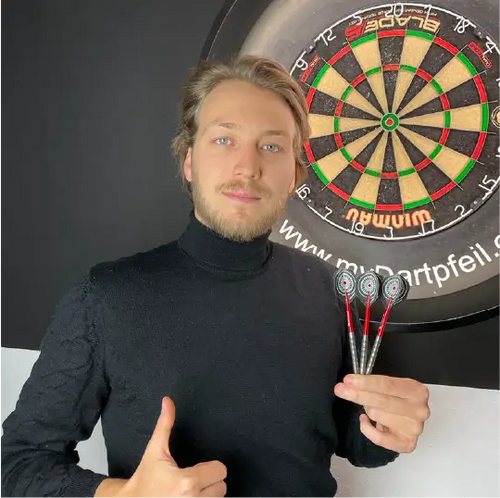There are now numerous darts tournaments in Germany. Due to the huge boom , numerous regional associations and leagues have been founded, offering regular ranking tournaments.
But many recreational tournaments are also on the rise. The level of competition in such darts tournaments is generally somewhat lower, as most participants are beginners.
In larger ranking tournaments, however, it's already clear how well darts Germany is positioned in the amateur sector . In this article, we'll give you tips on how to find, play, and organize darts tournaments.
Find a darts tournament – what options do beginners have?
Beginners without tournament experience often ask themselves the following question: How can I even find a darts tournament in my area ?
Here, we'd like to give you beginners a helping hand. This will make it easier for you to get started in dart tournaments. The first option is via Facebook .
There are several large groups , especially on Facebook, where you can find information about darts tournaments. In addition to social networks, there are also other sources where you can find information.

There are also several darts calendars available online. The website Dartkalender.de, in particular, offers you the opportunity to search for darts tournaments in Germany and darts events in your area .
There's also another platform: dartverwaltung.com . Here you can find all the leagues and tournaments in your region . But if that's not enough for you, you can also get information from the official state association . Each German state has a darts association that organizes and regulates all official ranking tournaments.
In my case, Rhineland-Palatinate, this is the RPDV (Rhineland-Palatinate Darts Association). This allows all amateur players to participate in the so-called Challenge tournaments .
Infobox: These are the places where you can gain your first tournament experience . I also gained my first competitive experience this way. Therefore, I highly recommend it. This way, you'll also meet new people and make your first contacts with the entire darts scene in the region.
Playing dart tournaments – rules and differences to hobby tournaments
If you're attending an official darts tournament for the first time, there are a few rules you'll need to follow as a newcomer. Newcomers to such tournaments are often closely scrutinized.
Essentially, you're playing in a standard challenge tournament. This is usually a best-of-3, 501 double-out format. So, this is nothing new for you as a player. What is new, however, in contrast to many recreational tournaments, is the opportunity to fight your way back into the tournament via the losers bracket .
In ranking tournaments, registered darts players also collect points for the respective darts ranking.
For example, if you face a strong opponent in the first round, you aren't automatically eliminated. In this case, you get a second chance in the losers' bracket . This allows you to essentially work your way to tournament victory.
However, if you lose a second game here, the tournament is over for you. Many recreational tournaments don't offer this option.
The loser acts as dart scorer
Another special feature is that the loser of a match acts as the scorer for the next match. As a newcomer to a tournament, you should also be aware of this in advance. Otherwise, you might be looked at askance after a loss.
These days, you no longer have to write on a blackboard . You can also enter scores using a computer program . However, you should also be familiar with the notation on the scoreboard .
This scoring board usually consists of two columns per player . On the left, you write the number of points scored. On the right, the remaining number of points is recorded.
A diagonal line through the last score and the last number of points shows how many points are left.

And one last little thing. When you make a three-digit shot, you should high-five your opponent . This is an unspoken rule and common practice at many tournaments and among many players. If your opponent doesn't comply, you can of course skip it next time.
Organizing a dart tournament – what you should pay attention to
Last but not least, we would like to give you a few tips for your own dart tournaments .
First, you should be clear about whether you want to organize ranking tournaments or hobby darts tournaments . We don't think it's a bad idea to adapt the rules of a hobby tournament to those of a ranking tournament.
This way, you'll learn to play under regular competitive conditions right away. You'll also be well prepared for your first ranking tournaments.

You can also find all the information you need about organizing a darts tournament in our e-book by myDartpfeil founder Lukas. This e-book contains all the common game modes for a darts tournament.
The field is usually divided into 16, 32, or 64 players . If fewer players are available, byes are awarded . Players with these byes then enter the tournament in the second round.
Prize money and organizations
The way the prize money is handled is also important. It's also nice if the entire entry fee is paid out at the end, at least in amateur tournaments.
In a ranking tournament, it is often the case that part of the fee is retained by an association .
You should also ensure that there are enough boards available . No player likes being allowed to play only for a few minutes every two hours. Furthermore, the reputation of a tournament suffers from poor organization.
Here we would like to give you a guideline:
- 16-player field: At least two boards
- 32-player field: At least four boards
- 64-player field: At least six boards
This way , you'll avoid long waiting times and keep all players entertained . We wish you the best of luck!
Ready to take your skills to the next level? Discover our exclusive secrets and proven methods to optimize your game:
- Dart Doubles Training : All secrets revealed: How to become a doubles pro. Learn more and train now. Click here » including free pro tips
- Killer Darts For beginners and pros. Discover proven strategies that will lead you to victory. Click in now & play successfully! Includes insider tips!
- Better darts through solo training: Dart training games on your own . Suitable for all skill levels. Learn more now and always throw accurately!
Sofern nicht anders angegeben, unterliegt das im Beitrag gezeigte Bildmaterial mit Bezug zu Dartspielern und verwandten Themen dem Copyright der Professional Darts Corporation (© PDC).

